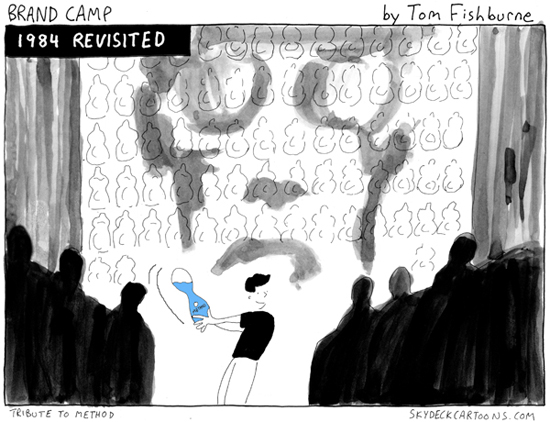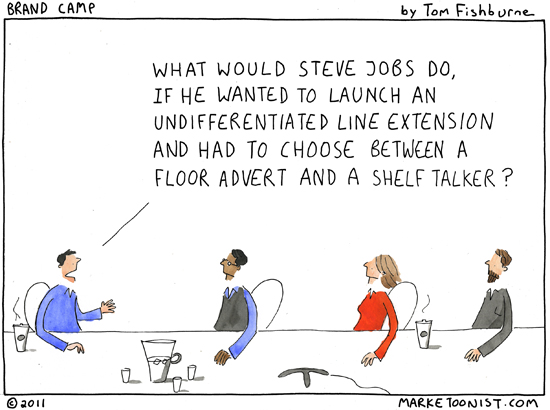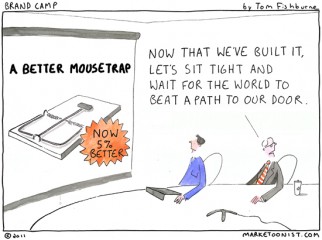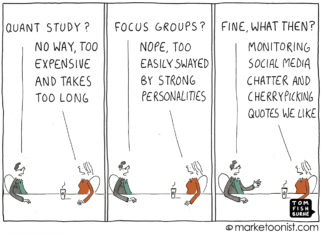Following last week’s news, it is hard to overstate the impact of Steve Jobs on the business psyche. He is arguably the most mythic business leader of our time. It has become almost cliche to reference Apple in a presentation.
Apple and Steve Jobs are used as inspiration in every imaginable industry and domain. Articles have referred to various entrepreneurs as the Steve Jobs of bicycles, of China, of meat (which is particularly funny because the real Steve doesn’t even eat meat). Businesses often ponder, “what would Steve do?”
Yet what worked for Apple won’t necessarily work for you. It’s like asking a brand to write like innocent, brainstorm like IDEO, or have customer service like Zappos. You can be inspired by what other companies are doing, but copying specific tactics alone won’t lead to the same results. Particularly if done narrowly or superficially.
As Steve urged in a 2005 commencement address, “Don’t be trapped by dogma — which is living with the results of other people’s thinking. Don’t let the noise of others’ opinions drown out your own inner voice.”
He meant that quote for individuals, but I think it applies just as well to businesses. Businesses need to find their own inner voice.
Yet in finding one’s own inner voice, there is so much to be inspired by in the Steve Jobs story. When I first came across the method cleaning brand in late 2003, I drew the following cartoon, riffing on the famous Apple 1984 ad. I was inspired that method was taking on Big Clean with similar energy that Apple took on Big Blue. The cartoon was my cover letter to method, and ultimately led to a job there.

I recently stumbled across historic footage when Steve aired for the very first time that Apple 1984 ad. He’s 28 years old. It’s amazing footage, knowing in hindsight how the next 27 years turned out.



Jerry Holtaway says
Steve wouldn’t ask.
JC says
It’s fun see the old ads. Apple has had its battles, but I think a better ad campaign that represents the company is the “Think Different” campaign. Here’s a quick history:
http://lowendmac.com/orchard/07/apple-think-different.html
Think Different celebrated “The ones who see things differently.” Einstein, Dali Lama, Muhammad Ali, Dylan.
Could a company be like that?
Could one person revolutionize 3 industries in his life time?
I think a few thinks we can take away from SJ’s legacy:
– You’ve got to be passionate about your work. If you’re not, get (or make) a new job.
– It is all about the product. Brands are only as good as the user experiences that customers have.
– Focus one fewer things, and do them better. Mac, iPod, iPhone, iPad. Not a huge list of SKUs is it?
– Sweat the details. They are like the fingers of giants.
Just a few thoughts after a tough week…
JC
Sandra Pickering says
I suspect Jerry’s comment is correct.
And that reinforces the point about ‘finding your own voice’. The external ‘voice’ (in speaking to consumers) will reflect the internal conversation and culture. Just as Steve will tell (not ask) his colleagues what is right, he will also tell the consumer what is ‘right’ for them.
It works. For a while. Until a heroic ‘maverick’ is no longer in touch with his audience. Then what?
Woody Savage says
Much of corporate America is losing its creativity. Executives spend most of their time trying to copy the competition…hard to be a leader if you are waiting to see what the other guy is doing first!
Technology, while great, tends to reduce the differentiation between product offerings, makes different products appear more like commodities. People who rely solely on technology to differentiate their products will soon lose their competitive advantage in the marketplace.
While not an Apple fan per se, I am a great admirer of Steve Jobs…not sure we will see an innovator of his magnitude in my lifetime.
Rich Binell says
What would Steve Jobs do?
He’d revolutionize your company, your industry, your life.
He returned and revolutionized Apple from a stumbling me-too-maker into the world’s largest technology company.
He’d revolutionize the standards for computers.
Let’s remember that before he brought the Macintosh to the rest of us, computers were just electronic typewriters.
But that wasn’t enough.
He’d revolutinize everything.
He revolutionized advertising (the Superbowl ad, 1984), computer interface design (the Macintosh mouse was the first popular application of the mouse controller, if you use a mouse today on any machine, you owe a debt of thanks to Steve), typography (Macintosh font selection was unprecedented) printing (WYSIWYG—whatyouseeiswhatyouget didn’t exist until the Imagewriter dot-matrix printer made it possible), photographs (Macintosh was the first computer that ever put photographs on a desk machine), movies (idvd), movie editing (imovie), networking (the plug-and-play Appletalk network), music players and music distribution (ipod and itunes) telephones (why would anybody need a browser on a telephone? Iphone answered that), and notepads (before ipad, notepads had goofy handles and buttons, after ipad, all the competitors look just like ipads and try desperately to work like ipads.)
Think about it.
Steve Jobs was the first person to put a real computer in your pocket.
One you can put real applications on. (Now the androids are trying to catch up.)
But he did it the painless way that never—ever—made you ask the question “Why would I need a computer in my pocket?”
He called it an iphone.
Long live Steve Jobs and the many revolutions he has begun.
Rosa Paredes says
There is awesome power in insight and it can only be an insight if you work through all the noise and find that (nonobvious) nugget that makes a relevant, significant, and longstanding difference to the ultimate customer, the consumer. We are all consumers and need to learn to tap into that inner instinct. That’s my inspiration from this week’s post.
AshC says
Steve Jobs took the time to redefine. Reposition. Reinvent. Reignite.
Every time I look at the Apple logo (as his products do take up space in my home, my office, and every cafe I visit), I clearly see his reflection, constantly looking forward to the next generation.
His vision is extraordinary and truly inspiring. Leaders and companies see this talent truly once in a lifetime.
However, it is dangerous when the CEO becomes the brand.
tomfishburne says
Thanks, everyone. Great insight and perspective on legacy of Steve Jos. This week’s cartoon goes to Rich for the all of the myriad of ways that Steve Jobs has impacted and will continue to impact our lives (and how we build brands and create for consumers as marketers). -Tom
Doug Shaw says
Hi Tom. I know I’m waaay too late for being in with a shout for the cartoon, but as an admirer of your work and that of Mr Jobs too I just wanted to say thanks for putting together such a great post spanning such interesting times. A really enjoyable montage. And I so agree, let others inspire you – but simply copying what works elsewhere is rarely the answer. Keep up the great work – Doug